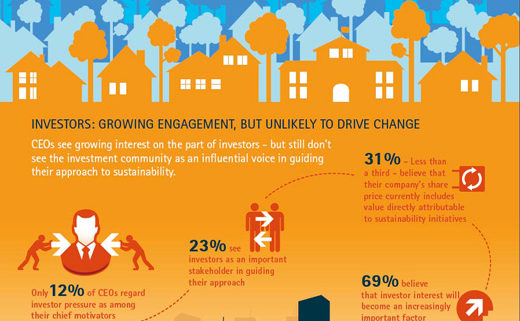Progress on sustainability is not rapid enough, says UNGC
The global economy is not on track, say CEOs, and business is not doing enough to help forge a sustainable future. This was the conclusion reached by business consultants at Accenture following the recent UN Global Compact’s (UNGC) Leaders Summit. Held in New York in September 2013, the conference united business leaders from around the world to discuss how business could contribute to and support the post-MDG agenda.
Just 32% of 1,000 CEOs surveyed by Accenture believe that the global economy is on track to meet the demands of a growing population within global environmental and resource constraints. Meanwhile, 67% believe business is not doing enough to tackle global sustainability challenges. Progress is simply not being achieved at the scale at which it’s needed. CEOs are therefore now calling for structures and systems that will enable companies to move forward collectively on achieving business success while becoming radically more sustainable.
Some 64% of CEOs expect sustainability to transform their industry within five years and 76% believe that embedding sustainability into core business will drive revenue growth and new opportunities. However, quantifying the business value of sustainability remains a struggle, which leads to frustrated ambition when it comes to driving action at scale. Business is restricted by the economic climate, and of course, companies are still caught between their traditional responsibilities to shareholders and their new responsibilities in promoting sustainable development.
There’s also a refocusing of attention on issues closer to home, with 64% of CEOs selecting ‘growth and employment’ as among their top priorities to address before health (18%), poverty eradication (16%) and water and sanitation (14%).
Some 76% of CEOs are satisfied with the speed and effectiveness of their own sustainability strategy and nearly two-thirds believe they’re doing enough to address the world’s sustainability challenges. This is worrying at a time when environmental and social challenges are only increasing, according to Accenture. While some companies are forging ahead with new innovations to create ‘shared value’, many are stuck in the routine of compliance and mitigation and see CSR as an act of philanthropy rather than a business-critical activity.
To enable progress, CEOs are calling for increased intervention by governments and policy-makers to align public policy with sustainability. 83% of CEOs see this as providing an enabling environment for the private sector to advance sustainability. They also want to learn more from corporate sustainability pioneers.
Some 85% of CEOs demand clearer policy and market signals to support green growth, and, in the context of discussions on the United Nation’s post-2015 development agenda, 81% of executives emphasise the need for governments to set a policy framework for ‘economic development within the planetary boundaries of environmental and resource constraints’ for the global economy.

The seven steps to sustainability and success, as defined by Accenture, are:
- Being realistic about the scale of the challenge – and the opportunity
- Using sustainability as a competitive advantage and to create value
- Tracking environmental and social indicators with precision required to quantify the business benefits of sustainability
- Using technology to innovate
- Engaging in fruitful partnerships and collaborations across industries and between the public and private sectors
- Broadening the conversation and engaging all relevant stakeholders via meaningful communication
- Business taking a leadership role in defining and delivering a sustainable global economy (including through the post-MDG agenda).
In terms of judging success, business leaders need greater ambition, speed and impact. And CEOs see the Global Compact as integral to catalysing action. The Global Compact, which comprises nearly 8,000 companies and 4,000 civil society organisations, already acts as a collaborative platform to address issues such as women’s empowerment, children’s rights, climate, energy, water management and anti-corruption.
Now, there is a growing recognition that collaboration at all levels will be central to companies’ success in building the skills they need to tackle major sustainability challenges, measuring value and performance, building positive dialogue with stakeholders and ultimately, achieving business growth while contributing to the sustainable development of people and planet.

